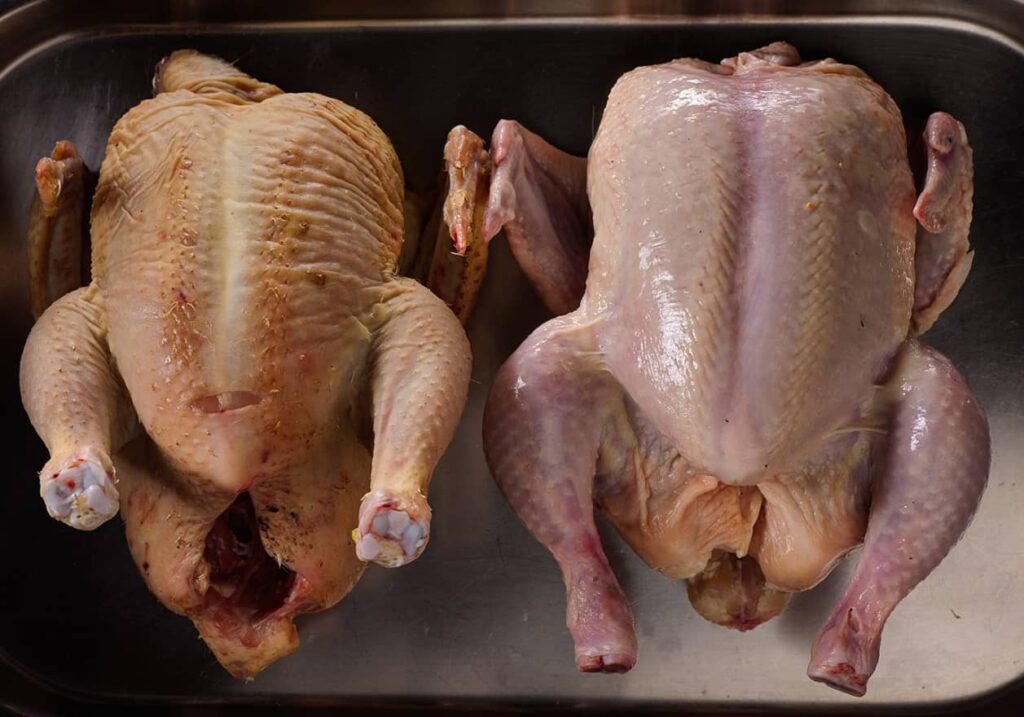Understanding Chicken Spoilage
Chicken spoilage occurs when bacteria, such as Salmonella, Campylobacter, or E. coli, multiply to unsafe levels, leading to foodborne illness. Proper storage, handling, and cooking techniques are essential for preventing chicken spoilage and ensuring food safety.
Signs of Spoiled Chicken
Foul Odor
Spoiled chicken may emit a strong, unpleasant odor, often described as sour, rancid, or ammonia-like. If the chicken has a pungent or off-putting smell, it’s best to discard it.
Discoloration
Fresh chicken typically has a pinkish hue. If the chicken appears gray, greenish, or yellowish in color, it may be a sign of spoilage. Additionally, any dark spots or patches on the chicken could indicate bacterial growth and should be avoided.
Slimy Texture
Spoiled chicken may develop a slimy or sticky texture when bacteria begin to multiply. If the chicken feels slippery or tacky to the touch, it’s best to throw it away.
Changes in Texture
Fresh chicken should have a firm and springy texture. If the chicken feels mushy, slimy, or excessively soft, it may be spoiled. Additionally, any noticeable changes in the texture, such as gritty or gritty spots, should be cause for concern.
Excessive Moisture
Spoiled chicken may release excessive moisture or liquid, particularly around the packaging or on the surface of the meat. If you notice pools of liquid or excessive moisture, it’s a sign that the chicken may have gone bad.
Off Flavor
Fresh chicken should have a mild, neutral flavor. If the chicken tastes sour, bitter, or unpleasant, it’s likely spoiled and should not be consumed.
What to Do if You Suspect Chicken Is Spoiled
If you suspect that chicken may be spoiled, it’s essential to discard it immediately to prevent foodborne illness. Do not attempt to cook or consume chicken that shows signs of spoilage, as cooking will not necessarily kill all harmful bacteria.
FAQs About Spoiled Chicken
How long does chicken last in the refrigerator?
Raw chicken can typically be stored in the refrigerator for 1-2 days before cooking. Cooked chicken can be refrigerated for 3-4 days. It’s essential to store chicken in the coldest part of the refrigerator and use it promptly to prevent spoilage.
Can you freeze chicken to extend its shelf life?
Yes, raw chicken can be safely frozen to extend its shelf life. Wrap the chicken tightly in plastic wrap or aluminum foil and place it in an airtight container or freezer bag. Frozen chicken can last for up to 9-12 months in the freezer.
How can you prevent chicken from spoiling?
To prevent chicken from spoiling, follow these tips:
- Store raw chicken in the refrigerator or freezer promptly after purchase.
- Keep chicken refrigerated at or below 40°F (4°C) to slow bacterial growth.
- Use refrigerated chicken within 1-2 days or freeze it for longer storage.
- Thaw frozen chicken in the refrigerator or cold water, never at room temperature.
- Cook chicken to the appropriate internal temperature (165°F or 74°C) to kill harmful bacteria.
Can you tell if chicken is spoiled by its expiration date?
While the expiration date on chicken packaging can provide guidance, it’s not always a reliable indicator of spoilage. Factors such as storage conditions and handling practices can affect the chicken’s shelf life. It’s essential to rely on sensory cues such as odor, appearance, and texture to determine if chicken is spoiled.
Is it safe to eat chicken that has been left out overnight?
No, chicken should not be left out at room temperature for more than 2 hours. Bacteria can multiply rapidly at room temperature, increasing the risk of foodborne illness. If chicken has been left out for more than 2 hours, it should be discarded.
Can cooking spoiled chicken make it safe to eat?
Cooking can kill some harmful bacteria present in spoiled chicken, but it may not eliminate all pathogens or toxins. Consuming spoiled chicken, even if cooked, can still pose a risk of foodborne illness. It’s best to err on the side of caution and discard any chicken that shows signs of spoilage.
What should you do if you’ve already eaten spoiled chicken?
If you suspect that you’ve consumed spoiled chicken and experience symptoms such as nausea, vomiting, diarrhea, fever, or abdominal pain, seek medical attention immediately. Foodborne illness can be serious and may require medical treatment.
Conclusion
Recognizing the signs of spoiled chicken and knowing what to look for can help prevent foodborne illness and ensure the safety of your meals. By following proper storage, handling, and cooking techniques, you can enjoy chicken safely and confidently. If you ever suspect that chicken may be spoiled, it’s best to discard it and avoid the risk of foodborne illness. Your health and well-being are worth the extra caution when it comes to food safety.
- Traptox Aka Trapezius Botox Treatment Near Outwood, Surrey - January 7, 2025
- Skin Pen Microneedling Near Brockham, Surrey - January 6, 2025
- Retinol Peel Near Horne, Surrey - January 4, 2025

